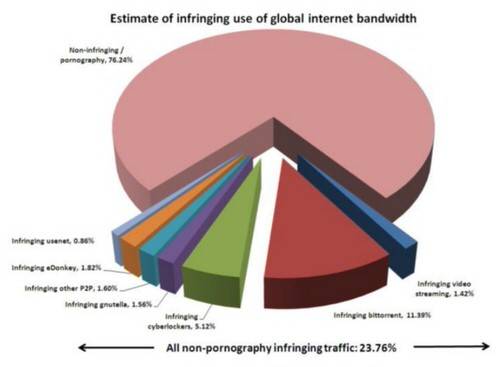A sizable chunk of Internet traffic went dark yesterday. No, I’m not talking about a SOPA protest. The #91 Web site on the entire Internet, Megaupload, was taken down after U.S. authorities executed a warrant to seize its Virginia-based servers and arrest four of its proprietors in New Zealand. To give you some perspective: On Google AdPlanner’s scale, Walmart.com is #97. Social document sharing service Scribd.com is #90. Huffington Post is #86.

To pretend it’s a revelation that Megaupload trafficked in illicit material is like Claude Rains being “shocked, shocked to find that gambling is going on in here!” That said, its “front parlor,” if you will, had many legitimate customers who had posted non-infringing files. So the big question that Colombia’s NTN24 news anchor Mónica Fonseca* asked me was essentially, “What has happened to everyone’s files?”
Colombia
Earlier today, I appeared on NTN24’s “CST” program (Health, Science, Technology) to discuss the ramifications of the Justice Dept.’s seizure of Megaupload’s assets and domain names. In response to Fonseca’s question, I said that folks who had uploaded legitimate files to their “cyberlockers” won’t be able to access them today, and will probably find them gone anyway if and when some form of Megaupload comes back online from outside U.S. borders. My ReadWriteWeb colleague John Paul Titlow shares the same sentiments.
Has the United States started a war in cyberspace, I was asked? Certainly there’s no doubt of there being a war on, I responded, although there’s some doubt as to who really started it. In any event, it’s clear that the Justice Dept. has fired a huge salvo, and the battle is now raging.
What lessons should consumers take away from this turn of events? I told Fonseca that it doesn’t take very much due diligence for a conscientious consumer to spot the difference between a legitimate cloud storage service with the consumer’s interests at heart (I cited Dropbox, SkyDrive, and Box.com as examples) compared with one whose interests lie in goading him to partake in illicit file sharing. There’s a reason there are no independently-managed search services pointing to files on a site like Dropbox. It’s not out to make files popular; it’s out to provide customer service. When a service promotes itself as free, but continues to offer services behind a gilded, camouflaged door marked “premium” or “subscribers only,” consumers should get the hint.
New Zealand
Commenters believing yesterday’s indictment had been timed to coincide with recent White House events on anti-piracy, such as the Administration’s backing away from SOPA/PIPA, were proven wrong in an early Saturday, New Zealand time, report from the ONE News agency. It quotes a detective inspector with New Zealand’s counterpart to the FBI as saying it had conducted a joint investigation with the FBI since early 2011, which led eventually to yesterday’s arrests.
New Zealand-based political blogger David Farrar made this interesting observation: “Whether or not [Megaupload founder Kim] Dotcom and others have broken the law, will of course be a matter for the courts. It is worth noting that the NZ courts will not extradite unless the charges are for something that is also an offence under NZ law.”
Brazil
Some perspective: A report released today from broadband services provider Sandvine estimated Megaupload’s share of all traffic for file storage and backup purposes (which would include cloud storage providers) was less than 1% in the U.S., but 11.4% in Brazil. Its share of all traffic among fixed access networks (i.e., non-mobile) is about 1%, which is somewhat less than the 4% the site claimed in its own music video, but is still a substantial chunk.
A search of Megaupload-related traffic among Brazilian domain names (*.br) today turned up a greater-than-average number of Megaupload search sites – the independently-run, volunteer-maintained indexes referenced in the Justice Dept.’s indictment – plus quite a few Brazilian resellers of Megaupload premium plans. Although basic file sharing is among the features Megaupload typically provides for free, so-called “unlimited” plans, according to the DOJ indictment, enable customers to post suspiciously long media files and enter into rewards programs, giving them rebates when those files become popular. E-mails uncovered through DOJ raids, mentioned in the indictment, indicate that Megaupload’s proprietors were particularly interested in the popularity list, giving users advice as to how to rank more highly.
The nature of such advice would make Megaupload no longer eligible for the safe harbor protections of the Digital Millennium Copyright Act, should the allegations prove true in court.
United Kingdom

At this time last year, U.K.-based search monitoring services provider Envisional made an estimate of the amount of total Internet traffic devoted to obviously (or, put another way, “shockingly”) infringing content. Envisional limited its analysis to non-pornographic content, for understandable reasons (its people probably couldn’t stomach the idea of wading through all that, and I don’t blame them). Non-pornographic infringing content was estimated to consume 23.76% of all fixed access traffic.
Some 5.12% of all fixed access traffic was devoted, by the firm’s estimate, to infringing traffic directed to cyberlocker sites, the biggest of which was Megaupload.
In a debate article published earlier today by the U.K.’s Guardian, the political leader of that country’s Pirate Party, music teacher Loz Kaye (who is not an MP) debated IFPI Chief Executive Frances Moore.
Kaye argued that it’s not really viable to estimate the damage Megaupload may have caused to the movie, recording, and publishing industries based on lost revenue (the DOJ indictment estimated a half-billion dollars) since the business model of these industries are, in his opinion, antiquated and failing. He stated he believes Megaupload could essentially represent the new music industry that should supplant the old one, saying, “We all – pirates and artists – have an interest in a properly functioning and free Internet. Last year 70% of the total volume of British music sales were digital. The [British recording industry group] BPI would do well to remember that its future income is dependent on the very people it is currently antagonizing.”
To which Moore responded that the new music industry is represented more by iTunes and digital music stores, not glorified file sharing sites. “We’re licensing music widely to sites like iTunes, Spotify and Deezer,” Moore writes. “This growing digital music business is fantastic for artists and for consumers. Yet it can’t survive in a market rigged by illegal piracy. Events such as the U.S. Justice Department charging Megaupload are important developments – not just for the music industry, but for the whole creative economy.”
* Wait, wait a minute, did he say “Mónica Fonseca?” As in, the fashion model, the spokesmodel, the judge on the Latin American version of “Project Runway?” The girl on several relationship-ending posters and calendars all over South America? Yep. The same.
Now, perhaps it’s NTN24 policy and perhaps my wife called in to make a special request. But because I don’t speak Spanish, when I’m being interviewed by Mónica via Skype, I hear her questions via a translator. Today it was Andrew. And I don’t see Mónica asking the questions until after NTN24 makes the replay available online.
Still, if you’re wondering, she’s a very good interviewer and speaks well to her subject matter. Perhaps through the marvel that is technology, my wife and I will have the opportunity one day to speak more directly with Mónica and her husband, Colombian screen sensation, actor Juan Pablo Raba. (My wife has policies too.)










